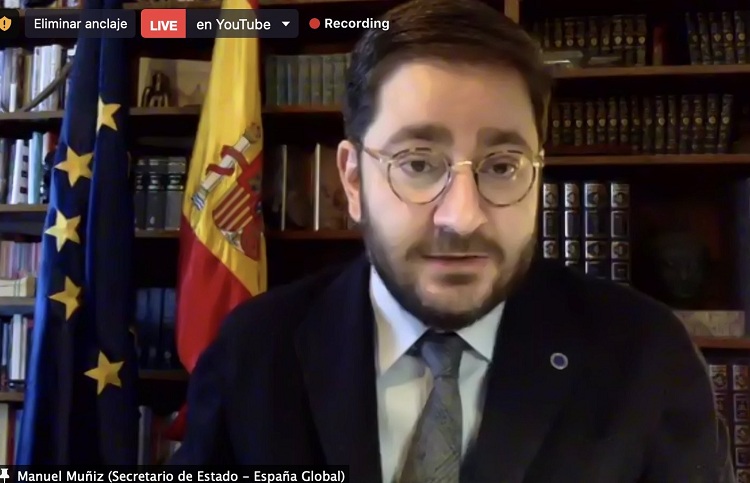Eduardo González
The State Secretary for Global Spain, Manuel Muñiz, considers the work of think tanks to be “absolutely vital” for the exercise of government and for external action in today’s world, marked by “speed, interdependence, complexity and the erosion of the architecture of global governance”.
“Think tanks are spaces for forward thinking, and the capacity of the Ministry of Foreign Affairs is enormously strengthened when we work with them”, Muñiz declared last Friday during his participation in the online debate entitled Think tanks, the pandemic and the recovery of Europe, organised by Fundación Alternativas, the Elcano Royal Institute and CIDOB.
According to the State Secretary, think tanks play a “fundamental” role in a world characterised by “four determining forces in the international sphere”. The first of these forces, he explained, is “speed”. “More data has been produced in the last two years than in the previous 20,000 years”, he said. “This acceleration in transformation presents us with enormous opportunities, but also threats, and forces us to have the foresight to plan adaptive public policies, which will be much better if we have the input of think tanks’ thought processes”, he added.
The second force, he continued, is “interdependence at the economic, political, cultural and communication levels, which makes the local become global”, one example of which is “the rise of populism and its impact on global political dynamics”. In these circumstances, he said, “in public administration and ministries of foreign affairs, we need people with a very deep knowledge of the local reality, such as the studies and analyses of think tanks”, and think tanks provide a “transversal” vision for problems that “represent an enormous challenge for ministries of foreign affairs”, such as “climate change, health or technology”.
Moreover, the “complexity” of today’s world (the “third determining force”) and “tackling problems” requires “a multidisciplinary approach, and this is another of the strengths of think tanks, as they have a great capacity to build teams to propose innovative solutions”.
In any case, according to Manuel Muñiz, “the backdrop of our time” is the “fourth determining force” in today’s world: “uncertainty and the erosion of the architecture of global governance”, which is resulting in “a regression in rights and freedoms” and in the evolution towards “a more closed, more nationalistic and less multilateralist world”. “To address this problem we need diverse and specific solutions, and think tanks are absolutely vital as a source of ideas and innovation in the face of these enormous challenges”, he said.
It is “absolutely vital” that there is a “connection between the world of think tanks and the public system”, as their “strengths are decisive in shaping our external action”, Muñiz concluded. The colloquium also featured addresses by Diego López Garrido, Executive Vice-President of the Fundación Alternativas; Charles Powell, Director of the Elcano Royal Institute; Antoni Segura, President of CIDOB; Federico Steinberg, Senior Researcher at the Elcano Royal Institute; Carme Colomina, Senior Researcher at CIDOB; Inmaculada Ballesteros, Director of Culture and Communication at the Fundación Alternativas; Vicente Palacio, Director of Foreign Policy at the Fundación Alternativas; María Solanas, Director of Programmes at the Elcano Royal Institute; and Pol Morillas, Director of CIDOB. The event was moderated by Marta García Aller, journalist and writer.






